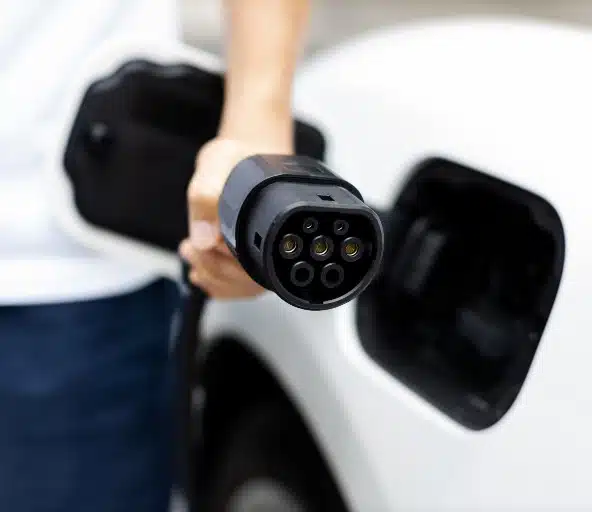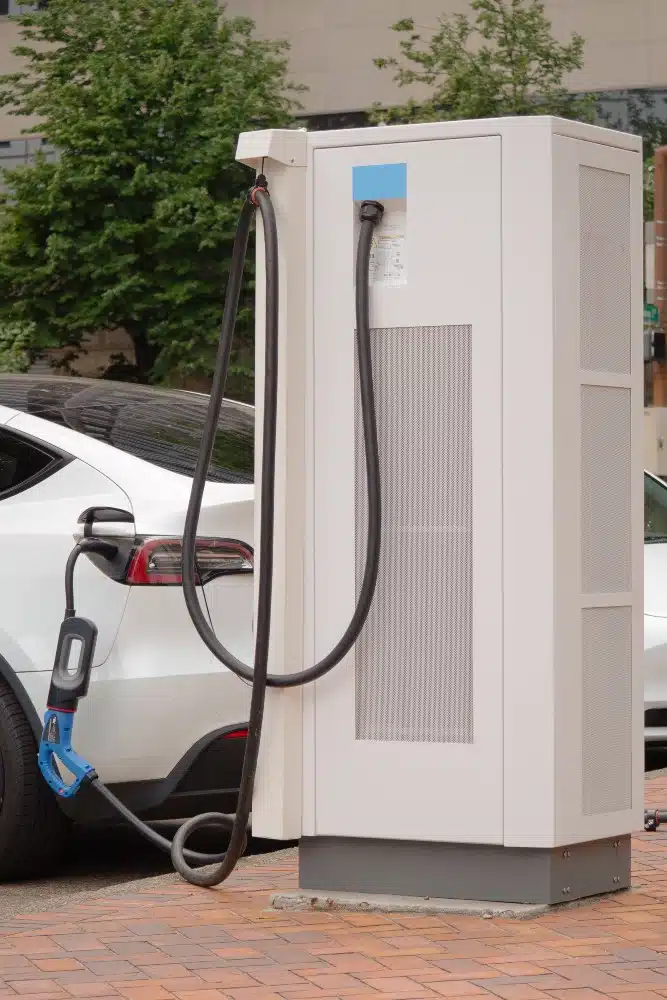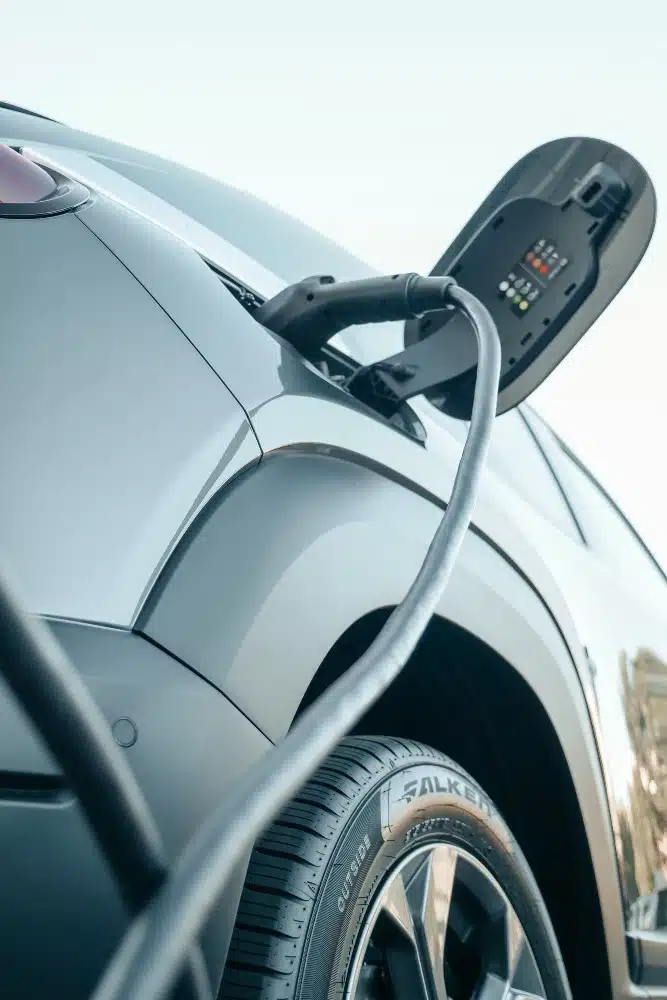EV Charger Connectors
Do All EVs Use The Same Charger?
No, all EVs don't use the same charger. There are multiple charger levels and connector types. While some chargers cater to specific EV models, others offer broader compatibility. It's essential to understand these differences for optimal EV charging in any setting.

The electric vehicle (EV) landscape has seen incredible growth in the last few years, and with this rise comes a common question we often hear at Chicago EV: “Do all electric vehicles use the same charger?” Whether you’re a business owner looking to offer EV charging for your employees or a property manager hoping to bring added value to your residents, understanding the basics of EV charging is essential.
Not One Size Fits All: A Quick Overview
The short answer is no; not all EVs use the same charger. Electric vehicles, though united in their environmental benefits, differ vastly in their charging needs and compatibilities. The automotive world has yet to converge on a single universal standard for EV charging, leading to various chargers and connector types in the market.
This variety can initially seem overwhelming, but it reflects the diverse range of EVs available. Understanding these differences is crucial for businesses, property managers, and EV owners alike.

Charger Levels
The world of EVs isn’t just about the cars; the charging infrastructure plays a pivotal role in ensuring these vehicles run smoothly. With different levels of charging, understanding the distinction can mean the difference between a quick top-up and an overnight fill. Here, we break down the various charging levels, highlighting their differences and where they fit best.
Level 1 Chargers
These are the basic chargers that usually come with your EV. They use a standard 120V AC outlet, and while they’re convenient, they offer the slowest charging speed.
Level 2 Chargers
The most common public and at-home charging solution. Operating on a 240V system, they provide faster charging speeds than Level 1 chargers. Our partner, Enel X, offers state-of-the-art Level 2 charging solutions that are perfect for commercial establishments in the Chicagoland area.
Level 3 Chargers (DC Fast Chargers)
These chargers provide the quickest charging solution, capable of charging most EVs to 80% in less than an hour. However, not all EVs are compatible with DC fast charging.

Connector Types
Connectors, the actual plugs that tether your EV to its power source, might seem like a minor detail, but they’re central to the EV charging experience. With various standards adopted by different manufacturers, the type of connector your vehicle uses determines its compatibility with charging stations.
J1772
This is a standard plug for most Level 1 and Level 2 AC charging. Almost all modern EVs in the U.S. come with a J1772-compatible port, making it the universal connector for non-fast charging.
CHAdeMO & CCS (Combined Charging System)
These are the two most common types of connectors for DC Fast Charging. While CHAdeMO is popular with Japanese manufacturers like Nissan and Mitsubishi, CCS is more common among American and European manufacturers.
Tesla Connectors
Tesla has its proprietary connector for its Supercharger network and home charging. However, adapters are available for Tesla vehicles to use standard J1772 connectors.
Adapters and Retrofits: Bridging Compatibility Gaps
While the EV industry is a marvel of innovation and eco-friendliness, it does come with its complexities, one of which is the range of connector types. For EV owners who may find themselves at a charger that isn’t directly compatible with their vehicle, adapters serve as a handy solution.
These devices allow, for instance, a Tesla vehicle to charge at a J1772 station, or vice versa. Moreover, businesses with older charging infrastructure aren’t left behind; retrofitting options enable existing stations to be upgraded, expanding their compatibility range.
This ensures that businesses can cater to the evolving needs of a growing EV user base without entirely overhauling their current setup.
Safety and Maintenance
The electrification of transportation isn’t just about sustainability; it’s equally about safety. Modern EV chargers are designed with multiple safety features, from ground-fault protection to weather-resistant casings. These features ensure that both vehicles and users are protected during the charging process.
However, like all infrastructure, EV chargers need regular maintenance to function optimally. Simple steps like inspecting connectors for wear and tear, ensuring the charging area remains clean and free from obstructions, and scheduling periodic professional checks can greatly prolong the life of a charger. And for businesses, it ensures a consistent and reliable service for their patrons.
Cost and Return on Investment
Installing an EV charger, especially in a commercial setting, is an investment. Costs can vary based on the charger level, brand, and additional infrastructure needs. However, the financial picture isn’t just about the initial outlay.
Governments and local municipalities often offer tax incentives, rebates, or grants to promote the adoption of green infrastructure. Businesses can also explore monetizing these stations, setting competitive pricing models to recoup costs and even turn a profit.
Moreover, offering EV charging can position a business as forward-thinking and environmentally conscious, attracting a specific clientele and enhancing brand value. Over time, as EV adoption continues to rise, the return on investment—both tangible and intangible—can prove significant for businesses willing to be early adopters in the Chicagoland area.
Why Choose Enel X Chargers for Your Commercial Needs
At Chicago EV, we pride ourselves on our preferred partnership with Enel X, a global leader in the EV charging industry. Their chargers are not only compatible with a wide range of EVs but also provide smart features like remote monitoring, advanced scheduling, and usage analytics. By choosing Enel X, you’re investing in future-proof and user-friendly charging solutions for your commercial establishment.
Final Thoughts
While EV charging might seem a tad confusing initially, the primary thing to remember is the difference between charger levels and connector types. As the world leans more towards sustainable transport, it’s essential to stay informed and choose the best solutions for your needs.